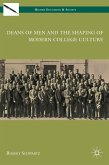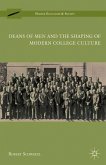This book explores how deans of women actively fostered feminism in the mid-twentieth century through a study of the career of Dr. Emily Taylor, the University of Kansas dean of women from 1956-1974. Sartorius links feminist activism by deans of women with labor activism, the New Left movement, and the later rise of women's studies as a discipline.
"A significant contribution to the history of feminism and of higher education in the United States, Deans of Women and the Feminist Movement explores women deans' commitment to gender parity in education and work from the early twentieth century. Using Emily Taylor's career as a lens, the book uncovers feminist work in the academy from the 1930s to the 1970s and decisively challenges a range of assumptions about feminist activism in these decades: that feminism went quiescent, that feminists were largely on the political left in American cities, and that the academy was a site of social conformity." - Mary Ann Dzuback, Director of Women, Gender, and Sexuality Studies at Washington University in St. Louis, USA, and author of Robert M. Hutchins: Portrait of an Educator
"Drawing on fresh archival research and extensive oral history interviews with the University of Kansas's Emily Taylor, one of the era's most important deans, Sartorius's engaging book opens up a new chapter inwriting about the history of student affairs and the history of women in education. Sartorius paints a compelling portrait of Taylor and provides a persuasive account of how modern deans of women helped empower women and fought for gender equity in higher education." - Andrea Walton, Associate Professor of Education and Philanthropic Studies, Indiana University Bloomington, USA
"Emily Taylor, observes her astute biographer, may have been the 'last of the great Deans of Women' at the then-male-dominated public universities who, under the guise of protecting women students, raised fundamental questions: Why educate women? Were they, like men, preparing for work in the public realm? If so, which employers would hire women? Taylor's own awareness that society valued her contributions less than those of the men around her placed her on the forefront of a feminist agenda for women's access to equal pay and professional advancement. In today's environment, Emily Taylor would have been on the forefront of the 'No Means No' movement to counter on-campus sexual assault." - Sheila Tobias, author of Overcoming Math Anxiety; They're not Dumb, They're Different: Stalking the Second Tier, and Faces of Feminism: An Activist's Reflections on the Women's Movement
"Drawing on fresh archival research and extensive oral history interviews with the University of Kansas's Emily Taylor, one of the era's most important deans, Sartorius's engaging book opens up a new chapter inwriting about the history of student affairs and the history of women in education. Sartorius paints a compelling portrait of Taylor and provides a persuasive account of how modern deans of women helped empower women and fought for gender equity in higher education." - Andrea Walton, Associate Professor of Education and Philanthropic Studies, Indiana University Bloomington, USA
"Emily Taylor, observes her astute biographer, may have been the 'last of the great Deans of Women' at the then-male-dominated public universities who, under the guise of protecting women students, raised fundamental questions: Why educate women? Were they, like men, preparing for work in the public realm? If so, which employers would hire women? Taylor's own awareness that society valued her contributions less than those of the men around her placed her on the forefront of a feminist agenda for women's access to equal pay and professional advancement. In today's environment, Emily Taylor would have been on the forefront of the 'No Means No' movement to counter on-campus sexual assault." - Sheila Tobias, author of Overcoming Math Anxiety; They're not Dumb, They're Different: Stalking the Second Tier, and Faces of Feminism: An Activist's Reflections on the Women's Movement








